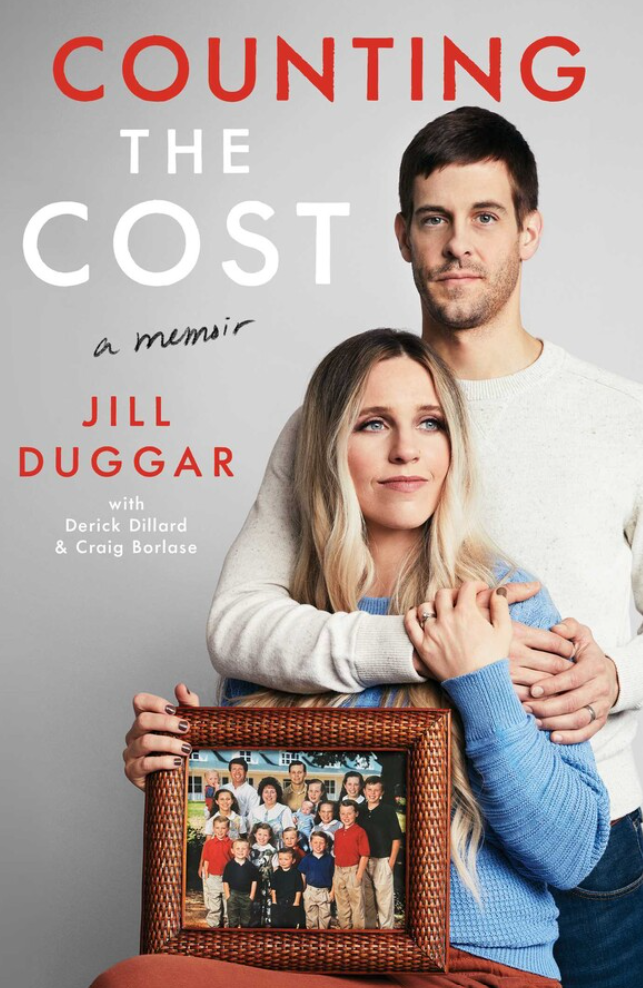Reality kids need savings, too



Jill Duggar recently spoke to PEOPLE and revealed just how much of a strain filming her family’s reality shows put on her marriage to Derrick Dillard.
"It caused a lot of frustration in our marriage," Jill told the outlet. "Especially early on, where he would feel a certain way about filming something. I'd be like, 'I hear you, I feel you, I also don't want to do whatever it is they're asking us to do either. But we have to.'"
The interview comes just days before the release of her memoir, written in conjunction with Derrick, called Counting the Cost. The book is full of bombshells about the disgraced Duggar family and explores how the pressures of filming affected them as a couple when they were looking to start their own life together.
Jill reminded the outlet that her family was raised to obey and honour her parents. This is a fundamental teaching in the Institute of Basic Life Principles (IBLP). This, she said, made it difficult to “disobey” not just her dad, Jim Bob, but TLC, too, considering her dad was the one that wanted the family on the show to help increase the visibility of the IBLP.
"It definitely got between us," she said. "No matter your age, you are to obey your parents wishes and you even have to ask them for their blessing for any major moment in your life. That could be buying a house, moving to a different state, where to go to school. We were dealing with this a lot when we were trying to make decisions for our family and we were really wrestling back and forth with it."
Back in June, I watched the Duggar family documentary, Shiny Happy People, which Jill bravely participated in, much to the dismay of her siblings Jed and Anna. I wrote about just how much of a strategic mastermind Jim Bob had been in maintaining a shiny happy image not just for himself, but his entire family during most of their time on TLC, even when it meant going to great lengths to ensure Josh Duggar’s sex abuse flew under the radar for as long as possible.
In the documentary, Jill was vocal about how the money the family was earning was withheld from her and her siblings, despite filming deeply personal and intimate moments, including the birth of her first child, Israel, when she had no interest in sharing that milestone with the world. Her requests to be compensated, which she made directly to TLC, were met with refusal and she was told that they “paid the family”. So Jim Bob was withholding money that should have been divided among the children, considering they were a key component of the show.
Money has been a huge topic lately. Well, it always has been. But with the ongoing strike, the idea of compensation and wages has really taken center stage. And there’s been a lot of speculation about how wages work when it comes to reality TV shows in particular, which, though not nearly as alcohol-fueled and curse-word-laden as the other shows in that category, includes 19 Kids and Counting and its spinoff, Counting On.
When it comes to protecting children that appear on screen, there has been a bit of progress made in helping to keep money kids earn through acting or performing in their pockets. But that’s for scripted productions. So when it comes to children appearing on shows like the ones Jill and her siblings did, there’s still a lot of work to do.
This PEOPLE article from 2015 lists some of the child stars that ended up in litigation over having their funds misappropriated, all at the hands of their parents. The list includes Mischa Barton, Macaulay Caulkin, the late Gary Coleman, Leighton Meester and LeAnn Rimes.
Long before these celebrities, though, the activism of Jackie Coogan, one of the very first child actors, would work to put protections in place to keep earnings in the pockets of its rightful owner. At just 18 months old, Jackie made his cinematic debut in 1918. At age 6, Charlie Chaplin saw him in a stage act and cast him in The Kid, which catapulted him to international fame and earned him several more roles.
Around 1923, he was earning $22,000 a year, which was a boat load of money back then. But three years after he became the sole survivor of a car crash that killed his dad and one other, he would learn that his mother and business manager stepfather had spent just about everything he’d ever earned, leaving him with next to nothing as he entered adulthood.
In 1938, he sued his mother and stepfather, which brought attention to the issue of parents and guardians spending money earned by their kids. And within a year, legislation passed in California for the California Child Actor’s Bill, often referred to as the Coogan Act. The bill states that money earned under a contract remains the sole legal property of the child who earned it. It also requires the child’s employer to set aside 15% of the earnings into a trust. According to SAG-AFTRA, Coogan accounts are required by California, New York, Illinois, Louisiana and New Mexico, and parents and guardians have to supply the Coogan account number to the employer.
Reality TV having an act similar to the Coogan Act might have helped Jill and her siblings immensely. But considering just how “new” reality TV is, the implementation of something like this has yet to be done. If there were more protections in place for people like Jill, the network would not have gotten away with simply “paying the family”.
With no system in place, it’s no wonder so many children who grew up as the faces of that network, which include the children of Jon and Kate Plus 8 and Here Comes Honey Boo Boo, have ended up in less than ideal situations in adulthood. So it makes absolute sense that Jill would continue filming despite not wanting to, particularly as an adult. Entering into adulthood with almost an entire lifetime of filming against your will, not having received any compensation for it, and also, no formal job training, how else would she make money?
There’s a pattern that often includes appearing on TV at a young age, followed by the adulthood realization that you were taken advantage of, often by networks and family members. Then comes some explosive (often exclusive) interview or perhaps a documentary, and then at some point, a book deal. Despite the temptation to want to gracefully exit the limelight, a lot of former child stars and even adult reality stars don’t have that option because they can’t afford it.
It’s part of the reason Bethenny Frankel’s efforts to get reality TV workers unionized, which I wrote about here, is picking up. Despite some Bravolebrities reportedly not wanting to turn their backs on Bravo or Andy Cohen, it truly is the Wild West right now and there needs to be some order and better protections in place for the people who make these networks millions of dollars each year. At this point, what other options are there? And with these shows slotted to fill the spots of halted scripted productions, there is more bargaining power than they might have without the ongoing strike. Here’s to hoping they use it wisely.
